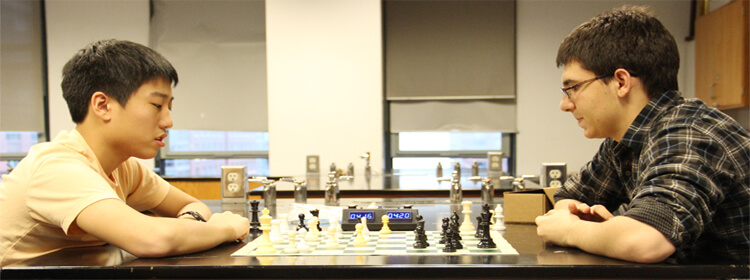We all know chess is more than just a game; I usually refer to it, herein, as game/art. However, it is a game and, as any game, it is meant to be played. Or can it just be “contemplated”, like a painting? Its art side...
Although both chess students and chess players devour chess books, profusely explore chess databases and massively download chess pgn files, the first (chess students) are unable to actually play chess, whether over the board, online or correspondence chess, and the second (“true” chess players) not only love competition but also I would risk to say books, databases and general study of chess is only a mandatory step to improve their competition skills, discardable if possible. Yes, you are right, I am just conceptualizing the extremes of this initial exposition. Given competition requiring study is not a matter of discussion, unless you are happily enjoying your below 2000 rating, does it make sense to study chess without competition?
Competition
I, personally, would feel empty and pointless, and I am sure you – the chess player (literally) reading this – would feel the same if chess was not to be “played”, if there was no competition. However, I presume it is not that uncommon chess is solely a matter of study rather than competition (what is theory without practice and practice without theory?!). At this point, I immediately think of some chess schools. Namely, I think of chess schools which may prefer the profit rather than having a true pedagogic vision. I mean, the chess player will know many chess teachers throughout its life, as it chess level improves. How many of us learned to move the pieces and advanced endgame theory with the same person? The true master (a teacher, in this sense) knows when the student has nothing more to learn with him. Then, it's time to move on and find a new master. Are chess schools ready for this continuous improvement? I hope so. Otherwise, castration is the word coming to my mind. And as chess still is a men's game (unfortunately), this word sounds so painful... Parents, do pay attention to this discussion and teachers please let the stars shine!
A chess student can greatly improve when it starts to play. Competition is an awesome driving force, and study will be easy together with a strong motivation. While some people might be afraid of competition, they shouldn't: competition is so natural as life itself. From the tiniest bacteria to higher plants, from the ramming horny males for a sexual chance to the menacing group of peers waiting for a job interview, competition is both ordinary and necessary. So, why to study chess for a long time (weeks, months, years!) without giving a chance to competition?
At any age
Chess is complex, though, as we know. We can be delighted with all the paintings and sculptures in a museum and never feel the pulse to buy a canvas to express our feelings in it... We can be happy just admiring the classic games played throughout the times, and we certainly need some knowledge of chess to fully enjoy such experience. And we can use chess to relax from our ultra-competitive society. It just depends on one's objective in its chess life. We must keep in mind chess is open to all students, at any age. Children and teenagers are not the only possible chess beginners. Why not to learn chess in midlife? Why not to give it a chance after retirement? One may have more time to admire it / learn it / play it; don't expect that older chess players are not ready to compete and just want to acquire the beauty of the game.
Personal development makes sense at any age. One can simply seek the skills necessary to and improved by chess (whether competing or just studying it): abstract thinking, concentration, problem-solving abilities, memory (visual, namely) and creativity, to name just a few of the most acknowledged chess virtues. Moreover, chess prevents Alzheimer and this awful disease seems to be more and more prevalent... Chess therapy? Another interesting topic for further discussion. For now, a final reflection: how chess would be nowadays without the competition pressure? Less developed? More “pure”? So different, I wonder...
Chess Editor
Paulo Morais




